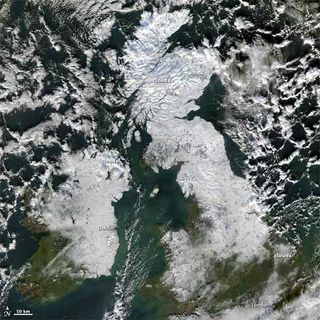
Snow Cover Lingers Over Great Britain and Ireland

Snow lingered in Great Britain and Ireland on Dec. 8 from storms that buffeted northern Europe in recent weeks, shutting down airports, closing off roads and leading to many deaths from exposure to the elements.
In this image, taken by NASA's Aqua satellite, snow extends from Northern Ireland southward past Dublin, and from Scotland southward into England. Snow cover stops short of London; the white over the city is clouds, which are distinguishable from the underlying snow by their billowy shapes and indistinct margins.
Rugged hills and gray-toned urban areas interrupt the snow cover, especially in northern England.
Airports and highways were closed due to the massive amounts of falling snow that hit the area. On Friday, Dec. 3, workers removed 150,000 tons of snow from the runways at Gatwick Airport, the second largest airport in the country, over the course of 36 hours, reported the New York Times. Despite these efforts, there were still only limited flights available.
The weather system that brought all that snow also depressed temperatures to record levels. The last time temperatures were so low for so long was in 1981 said the Independent Television News of the U.K.
The United Kingdom Met Office forecast that the cold weather would gradually loosen its grip on the region in the coming days. For Dec. 9 and Dec. 10, the Met Office has forecasted rain and warned of widespread icy roads.
- Snow Job: Winter's Lake Effect Blasts Buffalo, N.Y
- Observing Earth: Amazing Views from Above
- The World's Weirdest Weather
Sign up for the Live Science daily newsletter now
Get the world’s most fascinating discoveries delivered straight to your inbox.

